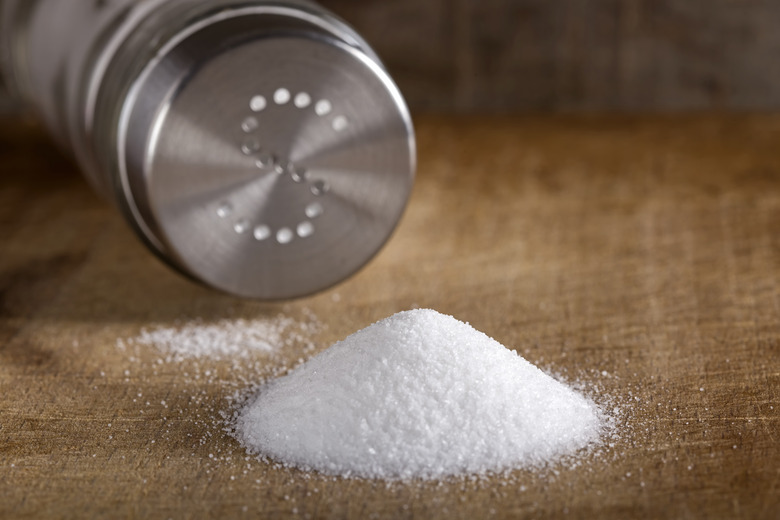Does Salt Change The pH Of Water?
In terms of pH, it doesn't get more pure than H2O. Water sits in the middle of the pH, or potential hydrogen, scale. Pouring table salt into a glass of water won't change that. To understand why not, it's essential to have a basic understanding of the pH scale and what kind of reactions must happen in order for solutions to move up and down that scale.
TL;DR (Too Long; Didn't Read)
Since adding salt to water does not result in any chemical reactions, the salt will not alter the pH level of water.
Playing With The pH
Playing With The pH
The pH value measures the level of acidity or alkalinity in a water-soluble solution. The scale measures from 0 to 14. Anything lower than a 7 measures as acidic, and anything higher than 7 is basic. Pure water has a pH level of 7, directly in the middle of the scale, and therefore is not considered to be acidic or basic. Changing its pH value to a level more acidic or alkaline requires a chemical reaction.
Getting a Reaction
Getting a Reaction
Each day, everyone from farmers to indigestion sufferers work to neutralize pH balances, whether they realize it or not. In order to change the pH level of a solution, you must add something to that solution that will cause it to be either more acidic or more alkaline. A common example is with soil. Most plants prefer soil that has a pH level of around 6 to 7.5. But some people live in areas where soil is too acidic, so they must add a base like limestone to the soil in order to raise the pH level. The active ingredient in agricultural limestone is calcium carbonate, which reacts with water. The chemical reaction works to neutralize the acidic soil, giving it the nutrients it needs to sustain healthy plants.
Salt, on the other hand, does not chemically react with water. Table salt is a mixture of one part sodium and one part chloride, or NaCl. When this combination hits water, it breaks down into separate ions of sodium and chloride. The salt becomes soluble in the water, rather than reacting with it. The addition of salt causes the volume of the water to change. But since that salt does not release or bind to the water's hydrogen atoms to jumpstart a reaction, the pH level of the water will remain the same.
From Pure to Alkaline
From Pure to Alkaline
If you do want to raise the pH of water, you could use baking soda, or sodium bicarbonate. When sodium bicarbonate combines with water, the ensuing chemical reaction makes water alkaline. A practical use of this reaction is in drugs like Alka-Seltzer, which treat conditions like heartburn and indigestion. When the sodium bicarbonate in an antacid tablet mixes with water, the alkaline solution works to neutralize the buildup of stomach acid that is causing the pain.
Cite This Article
MLA
Dragani, Rachelle. "Does Salt Change The pH Of Water?" sciencing.com, https://www.sciencing.com/does-salt-change-ph-water-4577912/. 19 April 2018.
APA
Dragani, Rachelle. (2018, April 19). Does Salt Change The pH Of Water?. sciencing.com. Retrieved from https://www.sciencing.com/does-salt-change-ph-water-4577912/
Chicago
Dragani, Rachelle. Does Salt Change The pH Of Water? last modified August 30, 2022. https://www.sciencing.com/does-salt-change-ph-water-4577912/
